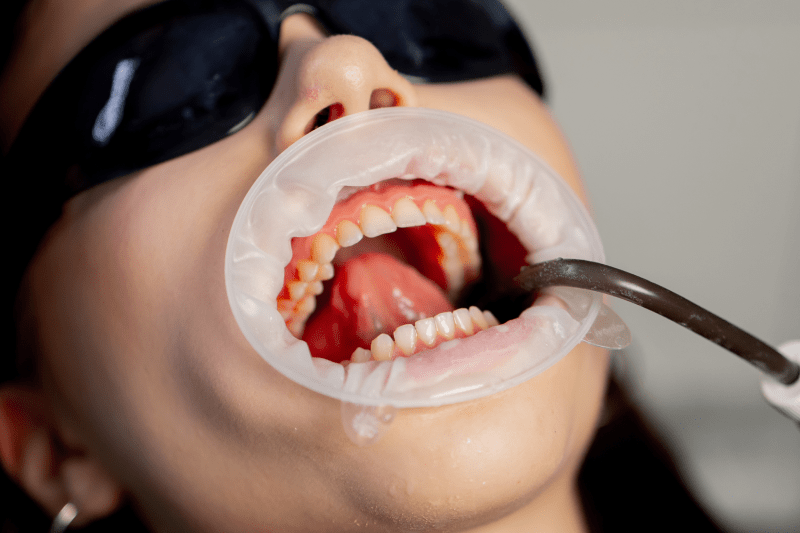What Is Root Canal Treatment And Why Is It Necessary?
Root canal treatment is a dental procedure performed when the tooth’s internal pulp (containing nerves, blood vessels, and connective tissue) becomes infected or severely inflamed. This often occurs as a result of deep cavities, significant cracks, or traumatic injuries to the tooth. The fundamental purpose of the treatment is to meticulously clean out the infected or damaged tissue, thoroughly disinfect the root canals, and subsequently seal the canals with specialized filling materials to ultimately save the tooth.
If this treatment is neglected, the infection can spread into the jawbone, resulting in excruciating pain and eventual tooth loss. Root canal therapy is vitally important for retaining the natural tooth, preserving chewing function, and maintaining dental aesthetics, offering a highly durable, long-term solution. A comprehensive dental evaluation is an absolutely essential prerequisite before initiating this crucial procedure.
What Is The Cost Of Root Canal Treatment In Istanbul?
The costs of root canal treatment in Istanbul vary considerably, depending primarily on the complexity of the patient’s treatment needs and the specific position of the tooth in the mouth. The price is typically determined by the number of root canals the tooth possesses (front teeth may have one, while molar teeth can have three or more) and the advanced technology utilized during the procedure.
However, generally speaking, prices in Istanbul are significantly more affordable compared to equivalent treatments in North America and Western Europe. This favorable cost advantage translates into receiving service with modern equipment that adheres to international quality standards. To obtain a precise price estimate, you should send your dental X-ray to a specialist and request a personalized quotation tailored to your specific case.
Can Prices Be Compared To Other European Countries?
The prices offered for root canal treatment in Istanbul are markedly lower than those in many other European countries, all while maintaining uncompromised quality of service. When specifically compared to locations such as the UK, Germany, or the Scandinavian countries, significant savings are achieved, not just in the treatment cost but also in overall travel and accommodation expenses. This beneficial economic situation is largely due to Turkey’s lower general operating costs and governmental support for health tourism. This strong financial advantage allows patients to not only receive treatment but also to fully experience Istanbul’s rich cultural offerings. The high potential for savings firmly establishes Istanbul as a globally attractive health destination.
Is Root Canal Treatment A Painful Procedure?
Thanks to modern dental techniques and the use of highly effective local anesthesia, root canal treatment is no longer the painful procedure it was once feared to be. The local anesthetic administered before the procedure ensures that the tooth and surrounding tissues are completely numbed, meaning the patient does not feel any pain or severe discomfort during the operation. Most patients describe the sensation during treatment as merely a slight vibration or pressure. The intense pain typically experienced originates from the infection itself, and the root canal treatment acts as the permanent solution that eliminates this pain. Afterward, mild sensitivity may persist for a few days but is easily controlled with over-the-counter or prescription painkillers.
Can The Treatment Be Completed In A Single Visit?
In straightforward cases where the infection is contained and not widely spread, root canal treatment can often be successfully completed in a single dental visit. This single-session treatment saves the patient time and greatly simplifies travel planning, especially for international patients. However, if the tooth’s root canals exhibit a severe or widespread infection, if there is pus or inflammation at the root tip (an abscess), or if the tooth has multiple complex canals, the treatment may need to be spread over two or more appointments to ensure the infection is completely eradicated. Your specialist will clarify the most appropriate treatment plan for your situation after the initial examination and X-ray analysis.
What Are The Quality Standards Of Dental Clinics In Istanbul?
The majority of modern dental clinics in Istanbul operate under internationally recognized high standards of quality and stringent hygiene protocols. Many clinics adopt procedures set by organizations such as European or American Dental Associations, emphasizing rigorous sterilization processes and absolute patient safety. In terms of medical equipment, they utilize the latest technologies, including digital X-rays, microscopy for endodontics, and advanced laser systems. Personnel are typically highly trained specialists who often speak multiple foreign languages and have participated in international training programs. These high operational standards ensure that Istanbul is not only an economical but also a profoundly trustworthy hub for health tourism.
What Type Of Anesthesia Is Used During The Treatment?
Local anesthesia is the standard type of anesthesia utilized during root canal treatment. The dentist only numbs the specific area around the tooth being treated, allowing the patient to remain fully awake and comfortable throughout the procedure. General anesthesia is typically reserved only for very young children, adults with severe dental phobia, or when multiple extensive surgical procedures are required simultaneously. The local anesthetic takes effect quickly, and its influence begins to wear off shortly after the treatment is completed. This allows patients to return to their daily routines or hotels almost immediately after the procedure, providing significant convenience for international patients.
What Factors Affect The Cost Of Root Canal Treatment?
The most significant factor influencing the cost of root canal treatment is the number of root canals that need treatment in the affected tooth. For instance, while front incisor teeth usually have a single canal, back molars can have three or four; as the number of canals increases, both the procedure time and the cost escalate. Additionally, the renewal of a previously failed root canal treatment (retreatment) is generally more complex and therefore more expensive than a standard treatment. The technology used (microscope usage, digital imaging) and the dentist’s specialization (general dentist versus endodontist specialist) also play a decisive role in determining the final price. Cure Holiday can assist you in clarifying these essential details.
How Long Does The Recovery Process Take After Treatment?
The recovery process following root canal treatment is generally rapid and does not typically cause severe discomfort. After the effects of the anesthetic have completely worn off, the patient may experience mild sensitivity or throbbing in the treated area. This discomfort usually resolves on its own within a few days and can be effectively managed with over-the-counter or prescribed pain relievers. Full recovery and the complete settling of the tooth may take a few weeks, but patients can resume eating and their normal activities immediately after the procedure. It is particularly important to avoid hard foods and refrain from using the treated tooth for chewing during the first twenty-four hours to ensure proper initial healing.

Is There A Risk Of Treatment Failure?
As with any medical procedure, root canal treatment carries a very small risk of failure, although the overall success rate is generally very high. Reasons for failure can include a crack in the tooth, a root canal that was not fully located or cleaned, or the development of a new infection over time. In cases where the treatment proves unsuccessful, a repeating root canal treatment (retreatment) or a surgical procedure like apicoectomy is usually considered to try and save the tooth. To minimize the risk of failure, it is strongly recommended that the treatment be performed by an experienced endodontic specialist who utilizes microsurgical techniques.
Is Root Canal Treatment Different For Children?
Yes, root canal treatment performed on children is different from the classic procedure applied to permanent teeth, and it is commonly referred to as pulpotomy (removal of only the pulp in the crown of the tooth) or pulpectomy (removal of the entire pulp). The purpose of these treatments in baby teeth is to prevent premature loss of the tooth, thereby ensuring it acts as a space maintainer for the permanent tooth that will eventually erupt underneath. The filling materials used differ to accommodate the natural shedding process of the baby tooth. Treatment for pediatric patients should be exclusively performed by professionals specialized in pediatric dentistry (pedodontics).
What Are The Possible Side Effects After Treatment?
The most common side effect following treatment is temporary sensitivity or mild pain in the area surrounding the tooth. This is the natural response of the tissue to the disinfection and filling process. Some patients might also experience jaw fatigue or a minor headache immediately after the treatment. Rarely, slight swelling or bruising of the gums may occur. Antibiotics and pain medication prescribed by the dentist help manage these side effects effectively. If the pain or swelling persists for more than a few days or intensifies significantly, this may indicate a continuing infection, and the patient should immediately contact the clinician for further guidance.
How Should Travel And Accommodation Be Planned In Istanbul?
For international patients planning root canal treatment in Istanbul, planning travel and accommodation is just as important as the treatment process itself. Although the treatment typically takes only one or two days, a travel itinerary that includes a few days of flexibility for unexpected circumstances should be created. Choosing accommodation in an area close to the treatment center with easy access to transportation ensures comfort for follow-up visits. Health tourism coordinators like Cure Holiday can manage all the logistical planning, from airport transfers to booking hotels near the treatment center, allowing the patient to focus solely on their treatment and ensuring the entire process is smooth and stress-free.
What Is The Preparation Process Before Treatment Like?
Before root canal treatment, the patient is generally required to have a detailed X-ray (periapical or panoramic). These X-rays are vital for the dentist to assess the extent of the infection, determine the number, shape, and length of the root canals, and identify any blockages. The patient must share their medical history, medications currently being used, and any existing allergies with the dentist. Immediately before the treatment, the dentist will ensure the area is clean and sterile before applying the local anesthetic. There is typically no restriction on eating normally before the procedure, but wearing comfortable clothing is recommended for the duration of the visit.
In Which Cases Is Tooth Extraction Required Instead Of Root Canal Treatment?
Root canal treatment is a method fundamentally aimed at saving the tooth whenever possible. However, in certain extreme situations, saving the tooth may not be viable, and extraction becomes the only alternative. These circumstances include a vertical fracture extending through the tooth root, insufficient bone support for the tooth, root canals that are too curved or blocked to be treatable, or the extensive loss of a significant portion of the tooth structure. The decision to extract is always considered as a last resort, made by a specialist after a thorough evaluation of all available treatment options.
Is The Tooth Restored With A Filling Or A Crown After Root Canal Treatment?
Root canal treatment can inherently weaken the tooth’s internal structure and often results in substantial loss of tooth material, making post-treatment restoration mandatory. If the loss of material is minimal and the remaining tooth walls are deemed strong enough, a filling is usually sufficient to restore function. However, if there is extensive material loss, particularly in back molar teeth that must withstand high chewing forces, a crown (cap) is strongly recommended to protect the tooth from potential fracture. The crown completely encases the tooth, providing maximum protection and significantly increasing its longevity. The dentist will make this decision based on a careful assessment of the patient’s specific dental situation.
Is Repeating Root Canal Treatment Possible?
Yes, repeating root canal treatment, commonly known as retreatment, is possible and frequently performed in cases where the initial treatment has failed. In this procedure, the dentist carefully removes the old filling material, re-cleans, disinfects, and then re-fills the canals. The reason for the initial treatment failure (such as an overlooked canal or inadequate cleaning) is identified and corrected. Retreatment can be more complex and time-consuming than the initial treatment but offers a high chance of saving the tooth from extraction. It is strongly recommended that this specialized procedure be carried out by a practitioner who is specialized in the field of endodontics.

Are Treatment Guarantees Or Follow-Up Services Offered?
Many reputable clinics in Istanbul offer a warranty for a specific duration covering the root canal treatment and the subsequent crown or filling procedures. This warranty provides assurance against technical failure of the treatment. Furthermore, especially for international patients, regular post-treatment follow-up and control appointments are scheduled. These follow-ups are often conducted using digital communication tools (email, video calls), allowing for close monitoring of the patient’s recovery process. The specific terms of the guarantee and the extent of follow-up services may vary depending on the clinic and the treatment package, making it essential to inquire about the details in advance.
What Are The Advantages Of Receiving Treatment In Istanbul?
The primary advantages of having root canal treatment in Istanbul include high quality of care, suitable cost-effectiveness, minimal waiting times, and exceptional patient-focused services. Turkish dentists are typically well-educated and possess extensive international experience. During the treatment period, you benefit from significant economic savings while also having the opportunity to visit one of the world’s most historically and culturally rich cities. Modern clinics utilize the latest technology, and communication issues are minimized thanks to the presence of foreign-language speaking staff. This integrated experience offered by health tourism is the core reason Istanbul stands out as a top choice.
Do Private Insurances Cover The Cost Of Root Canal Treatment?
Whether private health insurance covers the cost of root canal treatment depends entirely on the scope of your specific policy and the agreements your insurer has with clinics outside your home country. Many international insurance plans may offer partial or full coverage for dental treatments received abroad, but this coverage is often limited to ’emergency’ or ‘basic’ dental care. Before commencing treatment, you must contact your insurance provider to thoroughly understand your policy’s coverage and the reimbursement procedures for services received in Istanbul. Cure Holiday can provide valuable assistance in guiding you through these complex insurance processes.
How Long Does A Root Canal Treated Tooth Last?
A successfully completed and properly restored (with a filling or a crown) root canal treated tooth can potentially last a lifetime, provided it receives correct oral hygiene and regular dental check-ups. Since root canal treatment preserves the tooth’s root and structure, it enables the tooth to continue its function effectively. Factors that affect the tooth’s longevity include the quality of the final restoration (especially a crown), the patient’s chewing habits, and daily care routines such as brushing and flossing. With adequate maintenance, these teeth will function just like any natural tooth.
What Technologies Are Used During The Treatment?
Modern dental clinics in Istanbul utilize a variety of advanced technologies during root canal treatment to enhance success rates and ensure patient comfort. These include dental microscopes which magnify and illuminate the inside of the root canals for detailed visibility, apex locators which precisely measure the root length, and rotary (motorized) systems used for efficient cleaning and shaping of the canals. Furthermore, digital radiography devices, which emit less radiation and provide instant images, are used as standard practice. These technologies collectively and significantly increase the effectiveness and precision of the treatment procedure.
Which Foods And Beverages Should Be Avoided After Treatment?
After root canal treatment, especially until the final filling or crown is placed, it is crucial to exercise caution with what you consume. You should refrain from eating until the effects of the anesthetic have worn off to avoid inadvertently biting your lip, tongue, or cheek. To prevent the treated tooth from fracturing or cracking, you must avoid hard and sticky foods (such as ice, caramel, or hard nuts). Additionally, overly hot or cold beverages may trigger sensitivity during the first few days, so lukewarm or room-temperature drinks should be preferred. Adhering to all dietary instructions given by your dentist will greatly support successful healing.
How Does A Tooth Infection Spread Without Treatment?
An untreated tooth infection, initially confined to the tooth’s pulp, can rapidly spread past the root tip into the jawbone and surrounding soft tissues. This severe condition is commonly known as a dental abscess. The infection also has the potential to enter the bloodstream, allowing it to spread to other parts of the body; in rare instances, this can lead to severe and life-threatening systemic health problems. Furthermore, the infection’s action of eroding the bone can weaken the supportive structure of the tooth, leading to its mobility and eventual loss. For these critical reasons, treatment must be sought quickly as soon as any sign of infection is detected.
Can Sightseeing Be Done While Receiving The Treatment?
Yes, engaging in tourist activities while receiving root canal treatment in Istanbul is entirely possible, as the procedure is generally short and the recovery process is quick. For single-session treatments, patients can rest immediately after the procedure and begin light-paced sightseeing the next day. However, it is important to avoid activities that require high physical exertion or those that could put pressure on the treated area during the first few days following the treatment (e.g., extremely hot Turkish baths or strenuous climbing). More relaxed activities, such as exploring Istanbul’s historical peninsula or the Bosphorus, will not negatively impact your healing process.
Why Are X-Rays Before And After Treatment Important?
X-rays play a critical role in both the diagnostic and quality control phases of the root canal treatment process. X-rays taken before treatment allow the dentist to clearly visualize the extent of the infection, the number, location, and presence of any blockages in the root canals. During the treatment, some dentists may take additional X-rays to confirm that the filling material has reached the very tip of the root. The final post-treatment X-ray is used to confirm that the canals have been completely and properly sealed, and to document the success of the treatment. These images provide scientific evidence for the long-term viability of the procedure.
What Is The Minimum Time Required To Spend In Istanbul For Treatment?
If the root canal treatment can be completed in a single session, the minimum time required to spend in Istanbul is generally two to three days. This period allows for the examination and treatment on the first day, and an extra day for a potential check-up or necessary rest. However, if your dentist determines that the treatment requires multiple sessions, there may need to be a gap of several days or weeks between the appointments. For patients traveling from abroad, the most logical approach is to inquire about the possibility of single-session treatment and plan their travel accordingly. Cure Holiday will provide assistance with your travel planning to ensure efficiency.

Should Root Canal Treatment Be Performed By Specialist Endodontists?
Root canal treatment can be performed by general dentists, but in cases where the treatment is highly complex (e.g., curved canals, retreatment of a failed case, or multi-rooted molars), it is strongly recommended that the procedure be carried out by specialist endodontists. Endodontists are professionals who have received an additional three years of specialized training focusing exclusively on the tooth’s internal structure and root canals. They are more proficient in using specialized equipment like microscopes and typically offer higher success rates in treatment. Many modern clinics in Istanbul employ these specialists. Opting for a specialist based on the complexity of your treatment will significantly increase your chances of long-term success.
How Are Price Quotes Obtained And Compared?
To obtain and compare price quotes for root canal treatment in Istanbul, you must first share a dental X-ray (preferably a panoramic one) with potential clinics or health tourism agencies. When comparing quotes, you should look beyond just the price and carefully check what the package includes (e.g., does it include the initial examination, X-rays, final filling/crown, anesthesia, and medication). Also, inquire whether the quote reflects the experience of the performing clinician and the technological capabilities of the clinic. Cure Holiday can assist you by obtaining transparent and comprehensive quotes from reliable clinics on your behalf, enabling you to make an informed comparison.
How Does The Tooth’s Position Affect Treatment Duration?
The position of the tooth in the mouth directly impacts both the duration and the difficulty of the root canal treatment. Incisor teeth in the front of the mouth generally have a single root canal, making their treatment faster (often less than an hour) and simpler. Conversely, molar teeth located at the back of the mouth can have three or more complex and curved root canals. Treatment for these posterior teeth takes longer and requires much greater attention and precision. The difficulty in accessing the canals, which is dependent on the tooth’s position, can also be a factor that lengthens the overall treatment time.
What Should Be Considered Before Having The Treatment?
The most crucial thing to consider before undergoing root canal treatment is the selection of a reputable and trustworthy clinic and specialist. You should verify the clinic’s hygiene standards, the clinician’s experience, and their references. Furthermore, you must clarify all costs, including travel and accommodation, and thoroughly investigate your insurance coverage. It is also wise to purchase travel insurance in case of any unexpected complications during the treatment. Most importantly, you should clearly communicate your expectations and medical history with your dentist to reach a complete understanding of the treatment plan.
What Are The Payment Options And Methods?
Dental clinics in Istanbul that cater to international patients typically offer flexible payment options. The most common payment methods include cash payments (in Turkish Lira or international currencies like Euro/USD), credit cards, and bank transfers. For larger treatment packages, some clinics may offer direct invoicing with international insurance providers or pre-payment plans. To ensure that payment methods are not negatively affected by exchange rate differences or bank commissions, it is highly recommended that you obtain detailed information about all accepted payment methods, including any possible installment plans, from the clinic or Cure Holiday before starting your treatment.
Are Emergency Root Canal Treatment Services Available?
Yes, many large and modern dental clinics in Istanbul that serve international patients offer emergency root canal treatment services for those suffering from sudden and severe tooth pain. Emergency cases usually involve situations where the infection has progressed rapidly, leading to the formation of an abscess. In these critical situations, the primary goal is to immediately alleviate the pain and halt the spread of the infection. To secure an emergency appointment and minimize the waiting time, it is vital to contact the clinic or Cure Holiday immediately and clearly explain the details of your situation. Emergency treatment costs may be slightly higher due to the services being provided outside of normal appointment hours.
Is A Language Barrier An Issue In Istanbul’s Clinics?
As Istanbul is a major hub for international health tourism, the likelihood of encountering a language barrier issue in leading dental clinics is very low. These clinics typically employ well-trained patient coordinators and doctors who are capable of providing services in patients’ native languages (commonly English, German, Arabic, and other languages). Since effective communication is vital for the success of the treatment, some clinics also offer professional translation services, particularly for complex procedures. Inquiring about language support when scheduling your appointment will ensure a smoother and more comfortable process throughout your visit.
What Kind Of Support Does Cure Holiday Provide In This Process?
Cure Holiday provides you with comprehensive guidance and support from the very beginning to the end of your root canal treatment journey. They not only work exclusively with accredited and reliable clinics to secure the most favorable price quotes for you but also facilitate preliminary diagnoses by directing your medical X-rays to specialist doctors. They manage all the logistical details on your behalf, including travel planning, airport transfers, accommodation arrangements, and the coordination of your post-treatment follow-up appointments. This extensive support completely eliminates the stress associated with receiving treatment in a foreign city, allowing you to focus entirely on your recovery and well-being.



